MANAGALAJODI MEMOIRS
GAUTAM BANDOPADHYAY
“THAT’S HOW LIFE FLOWS ON”
In the wee hours of a winter morning, if you are on an earthen road meandering beyond the horizon through acres and acres of marsh, if you are mesmerized by the countless blobs of colours of different shapes dotted across the limitless marsh-green, and if for one reason or another those multi-colored shapes spread their wings and it seems the entire stretch of visible earth is going for a spin in the sky, yes, you are at Mangalajodi in Odisha.
I know you, already-charmed, would now want a ride on one of those boats lined up at an opportune point. Besides the boatman and you, on the boat there will be a guide with a binocular in hand. The boat will now leave the make-believe jetty, or whatever you’d like to call it, manoeuvre itself through a stretch of elephant-grass, turn left and abracadabra!—you are now right at the heart of a wonderland, wrought with wings of fancy. I know you are now in midst of birds… thousands, I should say lakhs, of them, mostly migratory.
This 3-hour journey is sure to keep weaving threads of magic in you, as has been the case with me; will last for a long, long time, as has been the case with me.
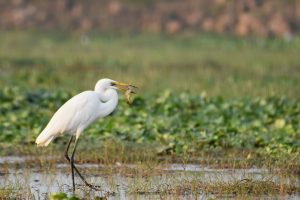
You’ll be surrounded by birds that come from almost everywhere up north. The busy-bodies will be all around you doing precious little more than searching—or waiting—for food, engaging in winner-take-all kind of territorial fights, or scurrying for cover when a bigger threat looms. In short they will be doing whatever they have been doing. They will not even notice you and the magic of it are made of precisely that. After a while you are sure to realize, as I have realized, you are a part of nature—nothing more, nothing less either. A long-forgotten feeling, isn’t that so! You and I are sure to realize that even in times when fangs and guns try to rule supreme, when men are up-in-arms against whatever nourished them, Nature still has a green large heart to soak it all, and still be beautiful.
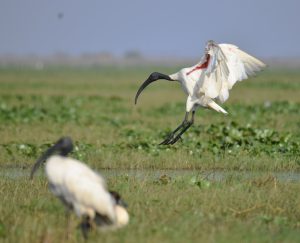
One of my dear friends, Nishi Pulugurtha has used a beautiful line of John Mark Green to add to her Facebook stories and I just can’t help quoting the line here—“May be that is my superpower—I can inhale pain and breathe out poetry”.
That’s Nature, that’s Mangalajodi…
Even now, as I am penning down these lines, reliving my moments of Mangalajodi, I have goose-bumps, when I fondly remember a bird, a Black-tailed Godwit—who comes from even as far as Alaska, foraging right beside our boat. We literally could have touched it, so close it was, we could see what food it was picking up, all the while so blissfully oblivious to our closer-than-ever kind of presence.
Let me tell you that though the Indian subcontinent is a preferred winter destination for so many winged migrants, nowhere else—I repeat, nowhere else—is it possible for you and me to get so much up-close-and personal to these feathered beauties, especially now when killing everything to add to the memory of our taste-buds has become so much the norm.
Look, for instance, at the state of things in North-East states— home to so many indigenous, as well as migratory, birds that are just getting wiped off, being too ill-equipped to survive our tongue- test. I am more aware of the ground realities of West Bengal where habitat destruction in the name of growth is a major threat to the survival of every living being. Here even the East-Kolkata wetlands, the lungs of the whole city and a Ramsar wetland, often finds itself mentioned as a wasted place which can be better utilized in some sort of ‘developmental work’! Apart from that, at night men—yes, people like you and I—spread nets over fields just to have bagfuls of the poor creatures who come from as far as Mongolia, Siberia, or Alaska, to name a few, to escape the bitter cold of their breeding places in winter.
From the cold to the fire—that’s the story, isn’t it?
Or, take for instance the story of a Gujrat, or a Navi Mumbai, where unsustainable growth is forever encroaching upon the natural habitats of all the animals and birds.
Only we have the absolute right to live, right?
Thus, to say that Mangalajodi is a 12sq km stretch of wetland at the northern edge of Chilika lake is not saying anything at all. The fact that according to the last bird count in 2019, it played host to more than 3 lakh of birds of 228 species may seem staggering, but it too is not all about Mangalajodi.

The real Mangalajodi exists as an antidote, at the extreme opposite to the story of human invasion. It is a fairytale. But it was not so always. It too was a place where poachers had the only laugh. The king of them was Kishore Behera, known as ‘Mangalajodi ka Veerappan’. One day, it must have been a spring day,– the Veerappans perhaps had had so many, so many, ‘I had not thought death had undone so many”—one Nanda Kishore Bhujbal, who was a person whose thoughts mattered, one Niranjan Behera whose brother was a forest officer, and twelve other co-fighters of the village started to convince the Kishore Beheras that the birds they were butchering for little profit could give them a life-line—a life of prosperity, recognition and dignity—if looked after properly.
They knew the birds could make the place a major tourist attraction. Once the Veerappans were convinced, I know it was a long hard battle of fighting weapons with logic and good sense, Mangalajodi was born of its own ashes. The once-poachers, all of them, now turned protectors of the birds, real conservationists.
In 2002 a new conservation trust was formed—Mangalajodi Ecotourism Trust.
Thus Mangalajodi started to happen; villagers’ kind of made friends with the birds. Accommodations for tourists were built, some took long hard lessons from noted ornithologists to know about and recognize the various species of birds. An NGO, funded by Royal Bank of Scotland, supplied the money for the initial set up and arranged the training programme.
Soon tourists from all over the country as well as from abroad started to come. The poachers’ boats now started to ferry tourists through the marsh. The herdsmen left their buffaloes to trudge through and splash around in the slush in order to make trailing ways for the boats. It became a temptation impossible to resist not only for the reputed bird-enthusiasts, the connoisseurs, but for the casual tourist-cum-bird-watchers too.
And the loveliest part of it is people-that-mattered decided to run the system on a co-operative basis. The steadily bulging coffers are distributed among all the villagers as per their efforts and roles.
Yes, there have been differences in opinion. Even one of the pioneers of this change, Mr. Bhujbal himself, has made himself unpopular due to some unfulfilled promises. Among his twelve followers, ten left his camp and through some rebuilding, this Mangalajodi Ecotourism Trust has come into being.
Today if you hire a package—there are two packages depending on the facilities offered—the money goes to Mangalajodi Village Trust. Whoever is associated with catering to needs of the tourists—the manager of the guest-house, the ever-smiling staff, the cook, even the boatmen and the guides, get a monthly salary, and they are happy with it too!
The rest of the money goes into the welfare of all.
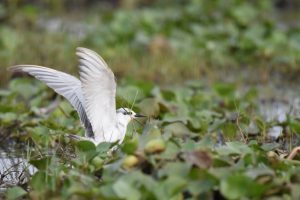
The NGO, CPSW, now promotes this Ecotourism Trust. The Trust has won several prestigious International awards for conservation as well as for building a system that benefits all. Its conservation effort is not only of birds, but for everyone.
Today they are planning to put a cap on the number of daily visitors going into the wetland, just to preserve the peace of the birds. That’s Mangalajodi for all.
All this go into the making of that magical moment of three hours—the boat ride and beyond…
Like life itself, it’s not mono-dimensional.
Say, you are much too charmed, just clicking away the eyes, the flights, the water spraying from wings that flap after a bath, and all that. And suddenly there comes a Marsh Harrier to snatch an unsuspecting or otherwise-indulged one snipe, or Crake, or anyone within the reach of the talons, just don’t wallow in pity.
That’s how life goes on…
After one or two bleak moments of empty stare, even the bereaved mother would pick up a fish or something else…
That’s how life goes on…
That’s how Mangalajodi flows on; just enjoy your ride till you can…
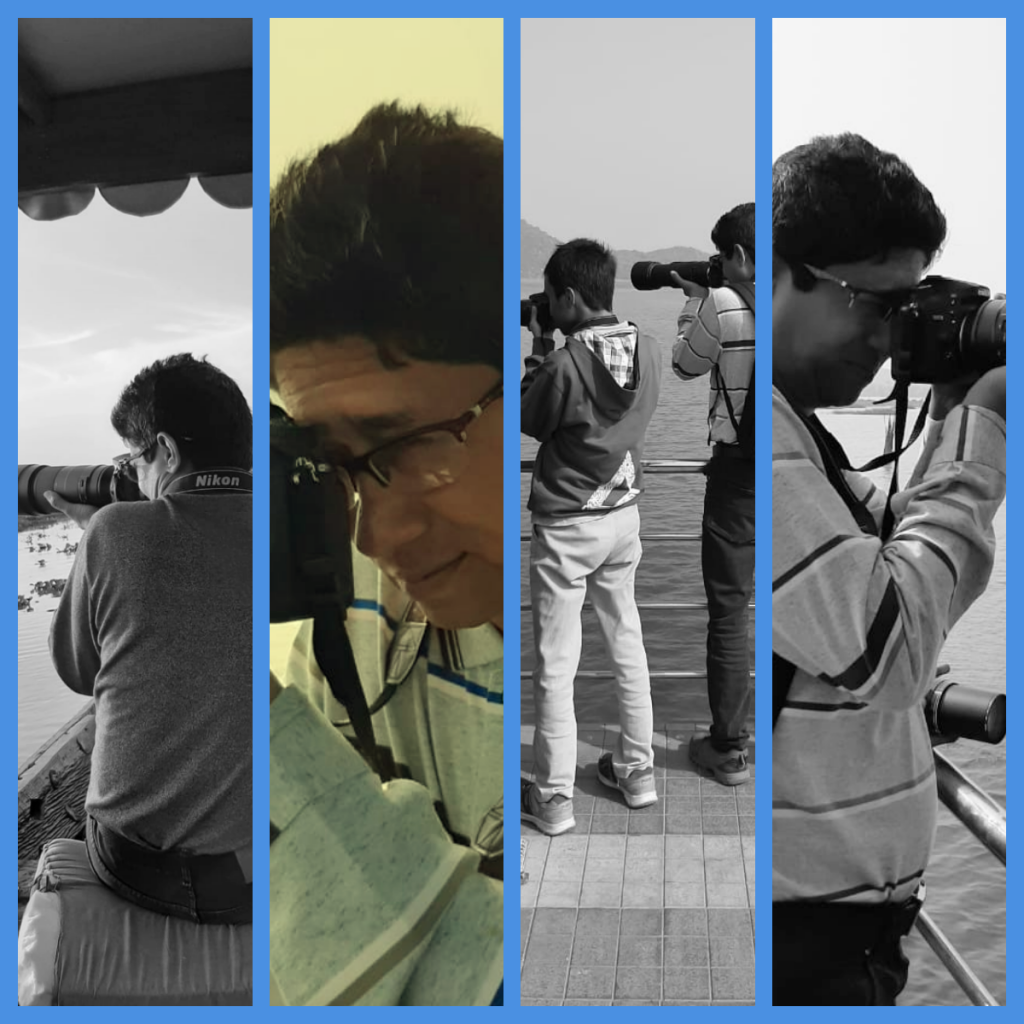
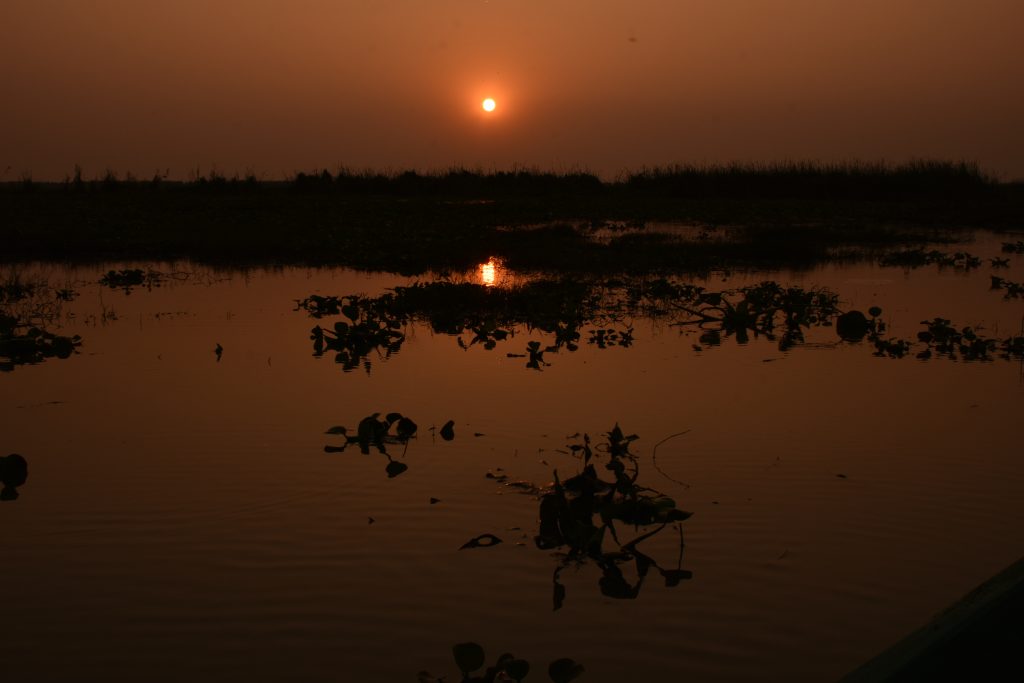

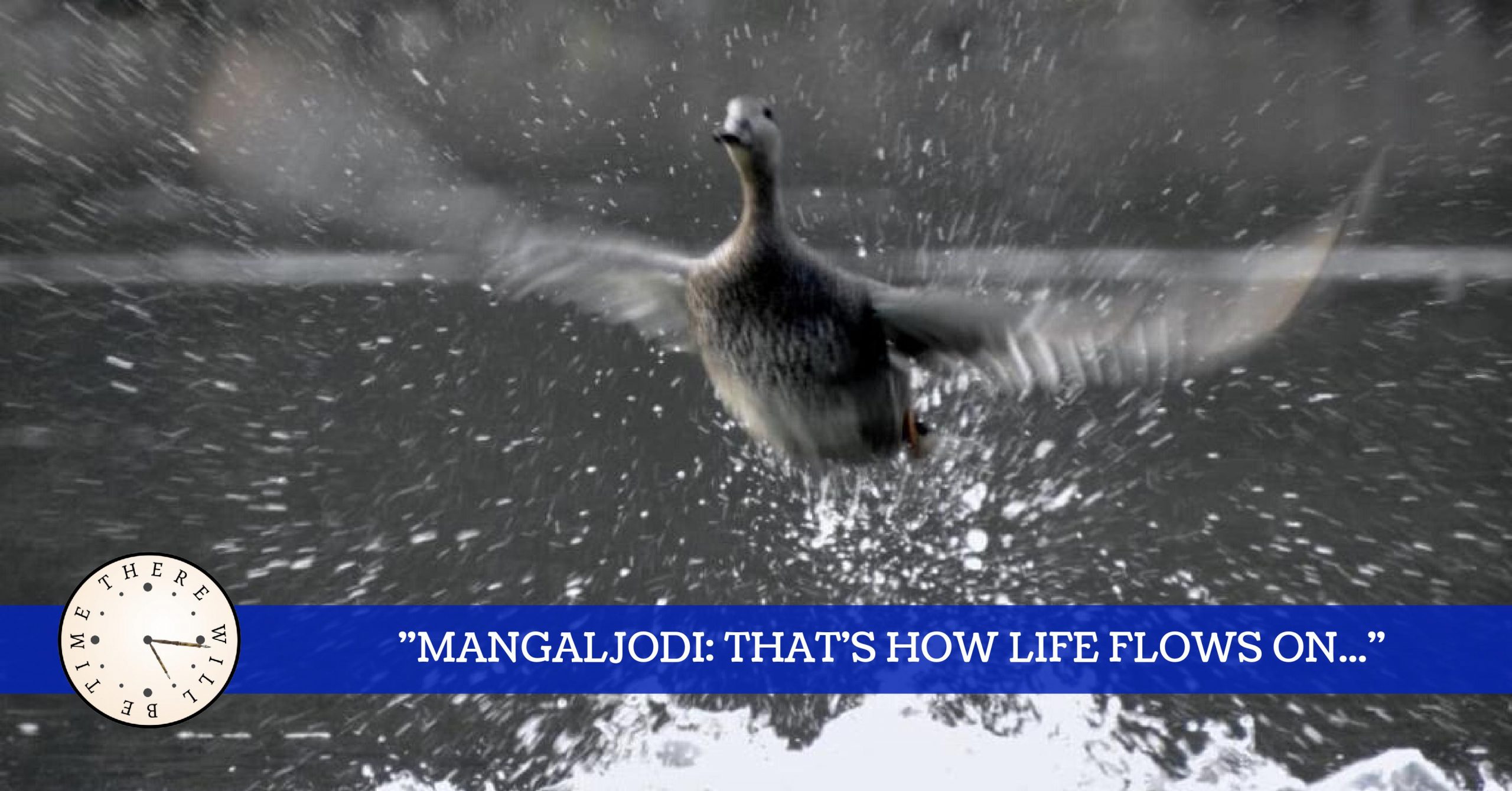












Enjoyed the guest post – lucid and interesting.